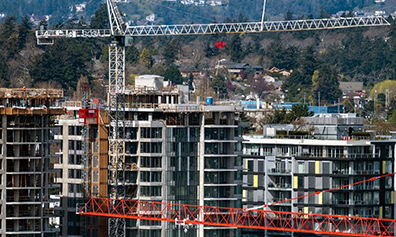Though Budget 2021 did not incorporate any direct benefits for the realty sector, many indirect benefits would flow in from the corroborative measures rolled out by the Finance Minister Nirmala Sitharaman.
When we as a nation are slowly emerging out of the pandemic, the real estate sector was looking at the Central Government to inject a booster dose for its revival by resolving the liquidity issues and modifying the GST regime into a more benign entity. While one had hoped for direct benefits from the budget for a faster revival of the real estate sector, we should welcome the indirect benefits flowing into the industry. These include:
Increased government spending on infrastructure
With infrastructure taking the lead, the realty sector will be among the first beneficiaries when developments kick in. The Finance Minister has tried to address the issue of infrastructure financing by a move to set up a professionally managed Development Financial Institution (DFI). It will be much like the Industrial Development Bank of India (IDBI) that will provide long-term finance to infrastructure projects. Such an institution will act as the much-needed catalyst for big-ticket projects that will lead to more infrastructure development and generate employment. Eventually, these would lead to more housing projects. Soon, the DFI would come into existence with a fund of Rs 20,000 crore. The Finance Minister’s focus to ease regulations relating to foreign portfolio investors is also likely to facilitate access to funds for infrastructure and real estate expansion.
The budget has not directly given anything to the real estate sector, but the Government’s continued commitment to the national highways promises corresponding growth in the sector.
Besides agriculture, the real estate sector is a big job generator and indirectly supports over 200 industries. The Government took this into account when it stepped up its infrastructure spending. Overall, the budget presents hope, but much will depend on how things pan out over the period. As of now, growth estimates from rating agencies and the International Monetary Fund (IMF) are encouraging, and once the economy picks up pace, the real estate sector would gather momentum and grow.
Hike in housing demand
The real estate sector will be a direct beneficiary of the continued focus on affordable housing, and the slew of measures to perk up demand such as lower interest rates on home loans, an extension of tax holiday for PMAY projects, increase in the safe harbour limit, and relief to NRIs from double taxation. On the supply side, help in speedier completion and delivery of real estate projects will come from measures aimed at ensuring a regular and adequate supply of labour. Improved health and insurance benefits for the construction workers and migrant labourers would help attract and retain the workforce.
Though unlikely to have any immediate impact on the real estate sector, this year's budget will surely help in the long run. And if the GDP shoots up, then along with other industries, the run-off effect would be felt here too. Chances are relatively decent for growth, with fully backed infrastructure projects for the country in the pipeline. The only thing to watch out for is, whether inflationary interest rates go up. If they do, their impact on the sector would be difficult to forecast at this juncture.
Over-regulation is a bane
For the real estate sector to grow up to its potential, there still is a need for long-term solutions and relaxation in regulations that govern the industry. Over-regulation is one factor that has somewhat adversely affected the sector, resulting in incomplete projects, delays and defaults. There are still multiple permissions to be sought from a plethora of agencies and departments. An effort to improve the ease of doing business in the real estate sector can make it more efficient, but yes, without compromising the home buyers' interests.
















